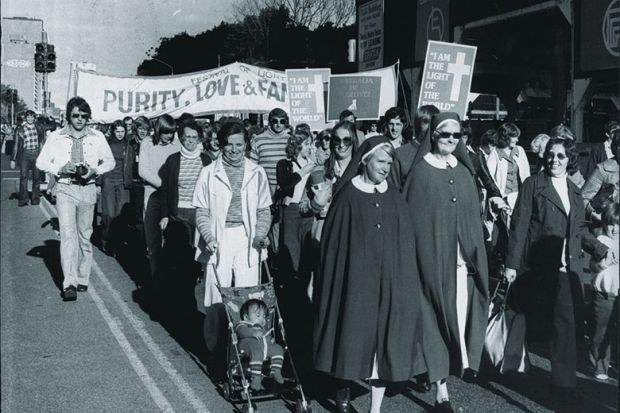If asked when was the high point of religious belief and observance in modern British history, most of us would probably plump for the late 19th century and Victorian morality. Yet Callum G. Brown suggests that it was in the years following the Second World War that attendance at church or chapel was at its peak, when Christian belief was taken as axiomatic, while Christian values and morality consciously underpinned law and custom.
This depiction of the strong hold of Christianity over post-war society enables Brown to point to the extent of the cultural and moral changes that transformed Britain in the 1960s, but the solidity of this apparently conformist post-war society can be questioned. It succeeded a wartime Britain in which many previous social mores had been challenged. The dislocation of normal life and the new freedoms that men and women experienced during the war had resulted in a temporary sexual revolution and soaring divorce and illegitimacy rates. Rather than a citadel of faith, post-war Britain may well have seen a desperate attempt to return to an imagined pre-war normality in a period of austerity, which was merely a pause in a process of social and moral change that regained momentum in the 1960s.
Nonetheless, we are taken through a fascinating discussion of the major legal clashes and moral debates of the 1960s between moral conservatives and those pressing against censorship of the arts and entertainment and laws limiting freedom of expression, particularly in sexual matters. Whether it was quite the fierce battle the author suggests is debatable, for there were few victories for the losing reactionary forces but rather a long petulant retreat. Was it in essence a battle between Christians and humanists? Certainly at the higher intellectual level, this may have been the case, although the churches were much eroded by divisions between conservative and liberal clerics. Some conservative clerics were prominent in campaigning against reforms such as the repeal of laws against homosexuality and easier access to contraception, but many of the attacks on what was seen as moral laxity were led by journalists, pundits and self-appointed crusaders. Those such as Mary Whitehouse, Malcolm Muggeridge and Lord Packenham were easily turned by satirists into comic figures. Humanists certainly played an important role in winning the intellectual debate, but it was the satirists, popular musicians and novelists who made an impact on a wider public that had never heard of humanism and made the moralists seem antiquated and ridiculous.
Whether religion, although undoubtedly important, was as central to wider cultural and social developments can be questioned. An alternative explanation for the cultural revolution is that it was a generational revolt against convention and restrictions on individual freedom of expression and was impelled by economic change. Increasing prosperity widened the choices available in social as in economic life and weakened traditional culture, while producing a new individualism that spurned not just organised religion, but all traditional constraints on freedom of expression. New fashions, music and moral attitudes may have cast aside religion, but they also departed from all that was traditional, local and old-fashioned. Secular and humanist arguments certainly played a part, but the demand for greater individual freedom was a wider cultural phenomenon.
A. W. Purdue is a visiting reader at the Open University.
The Battle for Christian Britain: Sex, Humanists, and Secularisation, 1945-1980
By Callum G. Brown
Cambridge University Press, 342pp, £22.99
ISBN 9781108431613
Published 7 November 2019


